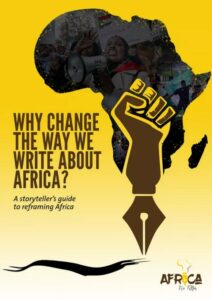Resource Title
Why Change the Way We Write About Africa? A storyteller’s guide to reframing Africa
Summary
Besides being outdated, stereotypical narratives of Africa have resulted in a significant gap between mainstream and alternative stories of the continent.
Africa No Filter’s handbook hopes to close this gap by equipping journalists and storytellers with the tools to write about Africa beyond stereotypes.
Resource Details
Description
The year is 1985, and Ethiopia is at the peak of a three-year famine that kills a reported 1.2 million people. Michael Jackson, Diana Ross, Stevie Wonder, and some of the most famous musicians in the world record the charity single, We Are the World. Over in the U.K, Bob Geldof stages Live Aid, a concert featuring Phil Collins, U2, Wham and Queen.
The impassioned pleas for the world to “lend a helping hand to life” by giving to Ethiopians raised millions. But for a generation, the story of Africa has remained one of poverty, as well as disease, poor leadership, corruption and conflict. It’s so pervasive that a New York Times story about the continent’s biggest soccer tournament, the Africa Cup of Nations, was framed through coups and Covid.
Stories – and the words and images used to tell them – matter. Repeat them over time, and they become the defining narrative of a people and place. Stories of poverty, poor leadership, corruption, conflict, and disease are the enduring ones told about Africa, creating the narrative of a broken and dysfunctional continent and Africans as dependent and without agency.
This handbook
- defines narrative and why it matters.
- provides a historical context to stereotypical narratives of Africa, from political events like the Berlin Conference, the Mau Mau uprisings and the Rwandan genocide to literature, music and film.
- Is organised into 6 sections with critical reflective questions, onward readings and references
Contents
- About this guide
- Narrative Matters
- The Danger of a Single Story
- What a ‘Single Story’ Article Look Like
- Who is Telling African Narratives?
- Take Back the Pen
- Be Your Own Watchdog
- Conclusion
Available from:
Download Why Change the Way We Write About Africa? A storyteller’s guide to reframing Africa PDF
Visit Africa No Filter

